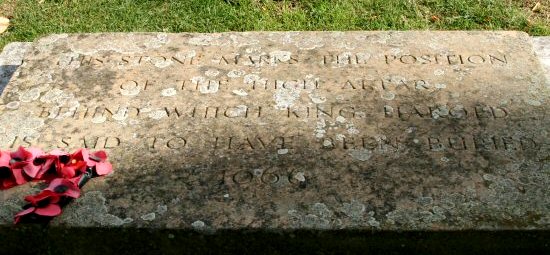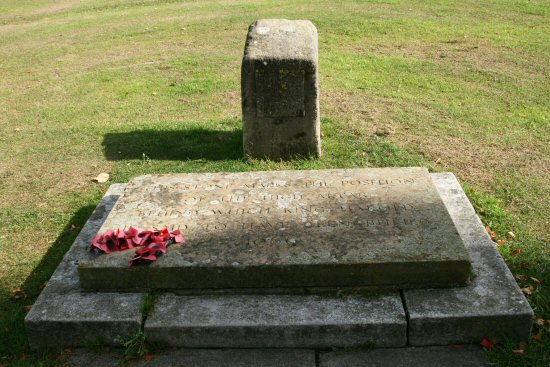 From Orthodox Christianity & the English Tradition: Hastings – 1066-1993
From Orthodox Christianity & the English Tradition: Hastings – 1066-1993
‘King Harold was slain, and Leofwine and Gyrth, his brothers, and many good men. This battle took place on the feast of St. Callistus.’
The Anglo-Saxon Chronicle
Accompanied by Malcolm Dunstall, I made a private visit to the site of the Battle of Hastings on 27 October this year. Malcolm Dunstall is the founder of ‘The English Companions’, a 300-strong society whose aim is to promote interest in and the values of Anglo-Saxon England. I was thus able to realise a childhood ambition, to go and pray for those who were slain at Hastings by the Invader of 1066 and died calling on the Holy Cross.
Having requested and received permission from ‘English Heritage’, I was able to serve the Orthodox memorial service with the Canon for Slain Orthodox Warriors. This took place at the Harold-stone, the very site where 927 years ago the fate of the English nation, and so the British Isles and the whole future English-speaking world, was to be sealed. It is our earnest hope and prayer that by the grace of God this historic anniversary commemoration, taking place on the very site and day of the fateful battle, 14 October according to the Orthodox / Julian / Old English calendar might yet become a regular and public event.
Despite the individual excommunication of Pope Leo IX twelve years before the battle, in 1054, we should not forget that the England of the period was still in communion with those who had not fallen away from the Orthodox Church, in the East. This is proved by the fact that the Norman Invasion was blessed by the Papacy and witnessed to by the many contacts after 1066 between Saxon England and Constantinople, where many thousands of Old English fled with their priests to escape the oppression of the Norman tyrant.
To the Orthodox mind, there is an even more direct link with Hastings. Harold’s daughter (born 1056) was to flee England after the Invasion for friendly Denmark and thence Russia. Here she married the future Grand-Prince of Kiev, Vladimir Monomach, in the Cathedral of Our Saviour in Chernigov in April 1074. Vladimir, himself half-Greek, was the grandson of St Anne of Novgorod, who had been baptised by the Glastonbury monk and missionary, St Sigfrid of Sweden. Among the children of Vladimir and Gytha was St Mstislav-Harold (in holy baptism, Theodore, feasted on 15 April), who bore a Slav name as well as that of his maternal grandfather. According to chroniclers, ‘no woman in all the world was ever happier than her’, Gytha had twelve children, another of whom, George (Yuri), founded Moscow.
In his 200-page epic on Vladimir and Gytha (printed with the blessing of Bishop Hilarion), the Russian poet Igor Avtamonov writes the following:
From sundry lands, like weeds lost root,
With promises of power and loot,
William scraped the scum of the earth,
To steal our homes, land of our birth,
Our wives and kinfolk and cots dear,
To rule as lords and despots here.
The poet concludes Part II, Chapter III, entitled ‘At Hastings’, with these words:
Harold the King died without fear,
But told us before the slaughter
That if he were to perish here,
We should save Gytha his daughter,
And give to her Old England’s crown
That we might cast the Normans down!
May the Lord look down upon us sinners and grant us, who have followed Gytha spiritually and sought to cast the demons down, eternal crowns in the unfading light of His Heavenly Kingdom.
In the sleep of the blessed grant, O Lord, eternal repose to the souls of Thy servants departed this life, Harold, last King of the Old English, his brothers Leofwine and Gyrth, his thegns, and all those who laid down their lives upon this field of battle for the Faith and England and grant them – ETERNAL MEMORY!
